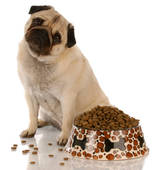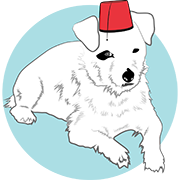
I asked the question on Sunday: Why can’t you vary your dog’s diet — so long as you keep it healthy — or switch it quickly?
As it turns out, my question conflated two issues. You often can and should vary your dog’s diet (but not always; more on which in a minute). It’s only when you don’t do that regularly that problems with switching can ensue. Here’s what Anthony Holloway, CEO of K9Cuisine.com, an online pet supply company for premium dog foods and treats, had to say on the topic:
In my opinion the notion that dogs should eat the same food forever is entirely a creation of pet food companies and their marketing department. I am very suspect of the idea. It is a relatively new concept that has gained popularity with the rise in popularity of mass-produced commercial pet food. There is no data whatsoever to support the “rule of thumb.” The only thing that supports the idea is pet food marketing and anecdotal statements by pet owners that had trouble switching food. I am not saying dogs do not have trouble switching. I am saying dogs have trouble switching because they do not change foods on a regular basis. So I would argue that the trouble pet owners experience is essentially a self-fulfilling prophesy. In my experience, the more variety a dog gets the easier it is to move from food to food. If a dog has eaten the same food for an extended period of time, then the transition will be more difficult and take more time. Also if the transition is from a lower quality food with lots of fillers to a food that is much higher in meat content this can and does slow the initial transition. So the more you change, the easier it is to change.
I think in general dogs should get a varied diet. I am a big believer in rotation and variety. I am not talking about just changing a formulation of the same brand. I am talking about changing everything, protein, carbs, and manufacturers on a regular basis.
In answer to my query to her, Lorie Huston, who has been practicing veterinary medicine for over 20 years-and who blogs at the Pet Health Care Gazette, offered the following medical explanation:
Every dog has a population of bacteria that inhabits the gastrointestinal tract. These bacteria are perfectly normal and healthy and they help ensure the well-being of the GI tract. One of the reasons we recommend a gradual transition is that a sudden change in diet can sometimes change the balance of the existing flora of the intestinal tract, which in turn can result in diarrhea and/or vomiting for some dogs. This will not happen to all dogs, but it’s difficult to predict which dogs will be affected in this manner — hence, the recommendation for a gradual change.
In dogs fed a more varied diet, the intestinal tract has usually already acclimated to the more diverse nutrients that it is presented. It also explains the reason that probiotics and prebiotics are often recommended when diarrhea occurs due to diet change or stress. These products help restore the natural balance of the flora in the intestinal tract, in essence helping good bacteria (non-pathogenic, normal flora) to grow and reproduce and reducing the number of bad (pathogenic) bacteria, which in turn helps restore the health of the GI tract.
A second reason that may be a little further removed from your original question relates to changing the diet of an animal that is suffering from a medical condition that necessitates a diet change (i.e., kidney disease, heart disease, etc). In these circumstances, research has shown that the acceptance of the new diet is higher if the diet is offered as a gradual change rather than a sudden one. This is particularly true for cats which, as a species, tend to become stressed with even minor changes in their routines. However, it does apply to some extent to dogs as well.
Several people who commented on the original post noted that some of their dogs thrived on a varied diet, while others did not. My guess: Inbreeding has weakened the digestive systems of some breeds.
Case in point: The Norwegian Lundehund. This strange and wonderful breed — among other features, Lundehunds have a minimum of six toes and can clamp their ears shut to keep out dirt — is so prone to a complex of gastrointestinal problems, including Inflammatory Bowel Disease, that these problems have been dubbed “Lundehund Syndrome.” A vast majority of these very rare — and very inbred — dogs carry the gene that causes it.

I really like Anthony’s answer … there can be problems rotating foods if the rotation does not occur often enough. I will admit that we don’t rotate our dogs’ diet, the main reason being the limited amount of storage space we have in our RV. We take some comfort in knowing that we are providing Ty and Buster a high quality, close to raw, dehydrated food that they really thrive on.
Rod, no reason to apologize for not rotating your dogs’ diet; most of us don’t have the time or inclination. Now that I have the knowledge that it’s desirable, I might consider it — but I was completely in the dark about the desirability until now. Something to put into the next edition of my book…
What an interesting concept about rotating the food. If the priority is maintaining high quality ingredients and proper nutrition, I’m guessing our dogs will benefit from the variety. I know I would get bored eating the same thing every day!
I think I ate a tuna fish sandwich every day for lunch for an entire year when I was a kid, but I’m way over that now! And yes, eating the same thing every day would be boring.
Anthony’s commentary completely comports with my experience, and now I have evidence to give to all my critics who said I was nuts for rotating Archie’s meals…woo hoo!
Always glad to provide ammunition to anyone who would be foolish enough to doubt you 😉
As I noted in your previous post, I’ve been rotating proteins and oils, grains, vegetables, and fruits for Tashi, and did it very carefully at first. Now I have no trouble switching him out each week. I have no diarrhea, anecdotally his anal sac issue seems to be gone and he’s one happy little pup.
Loved your reference to the Lundehund. I vaguely remember the post I did on the
“back from the brink of extinction” – it’s got to be a razor’s edge they walk in breeding that tiny population, and more inbred illnesses will no doubt rear their uglyheads.
Great post. I think it’s an individual thing. Having had a dog with irritable bowel disease, I wish I had done this more in her life. With a new cocker to share my life with, I am of the “if it ain’t broke don’t fix it” school right now. But I am always open to rotation, and having a love for a breed prone to food allergies, one never knows.
I fully agree self-fulfilling prophesy theory. Kids who are fed sloppy fatty junk food like it and have troulle coping with healthy “normal food” dogs are the same they can be programmed into any single food type. Our dogs have allways had a mixed diet of canned and dry food along with leftover meat. Our two labradors also show individual preferences, Daisy will not leave the kitchen if you are cooking Duck, Barney loves Seafood. Both dogs enjoy their food and do not just consume it as fuel.